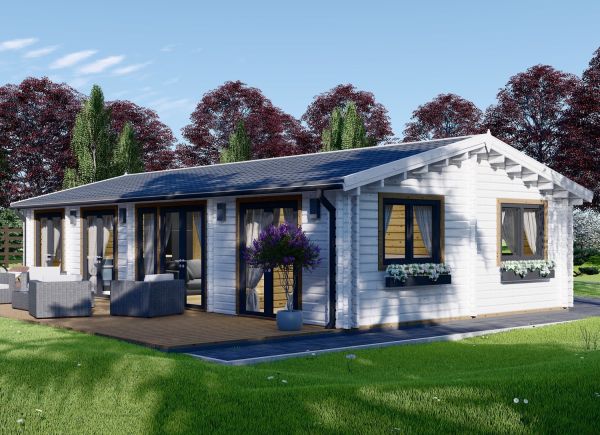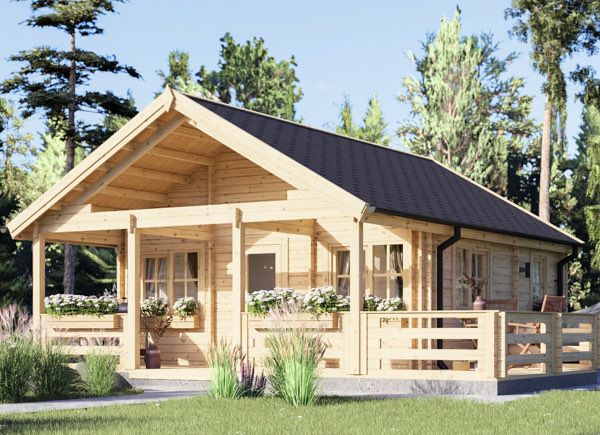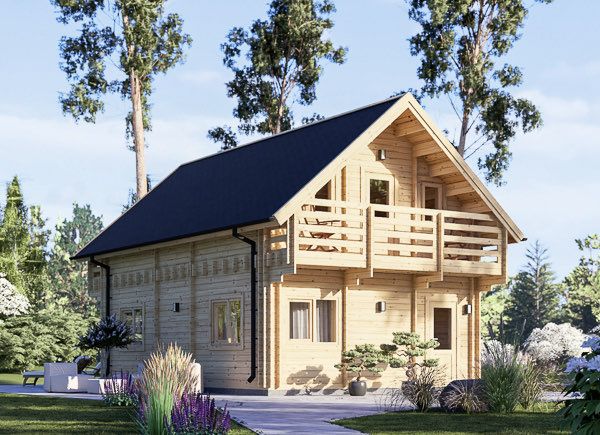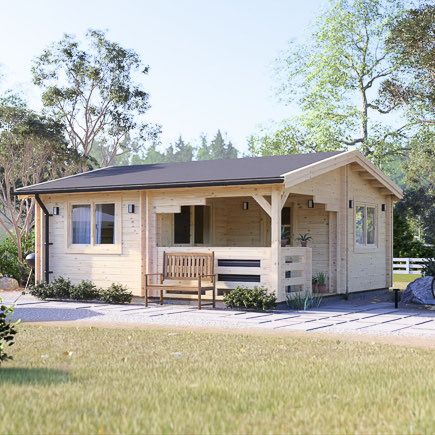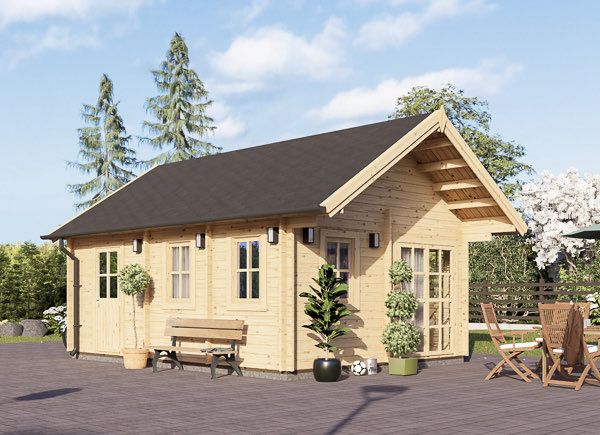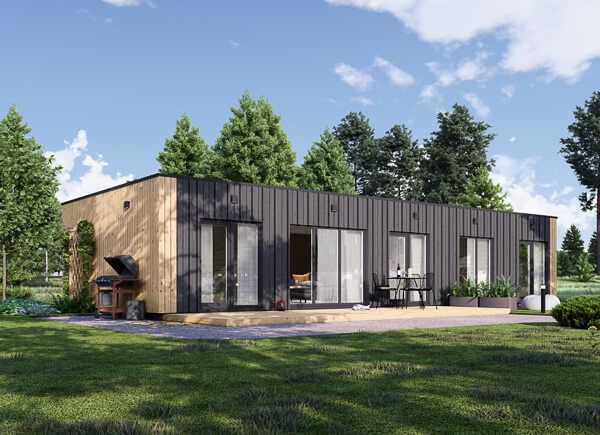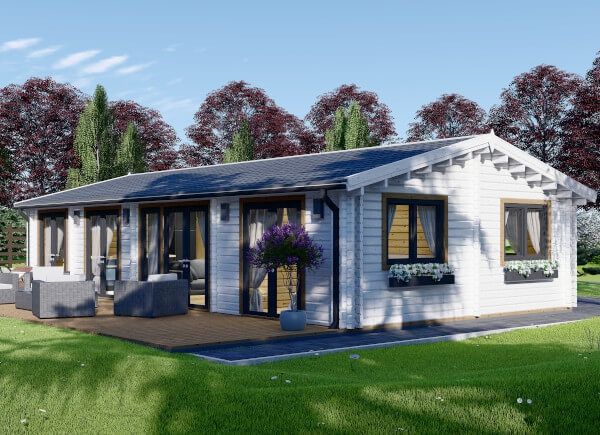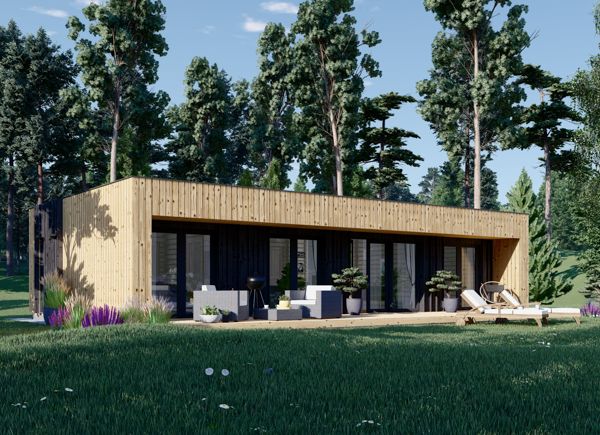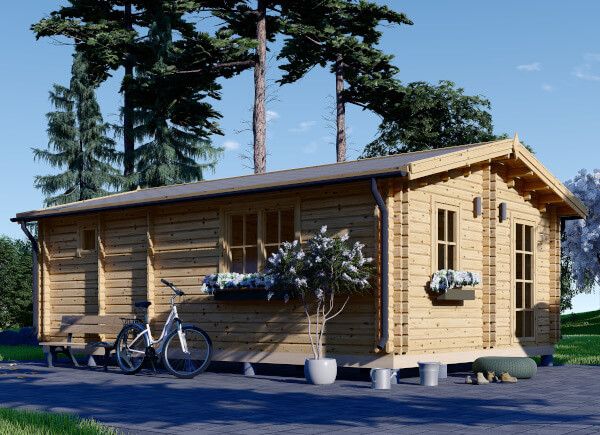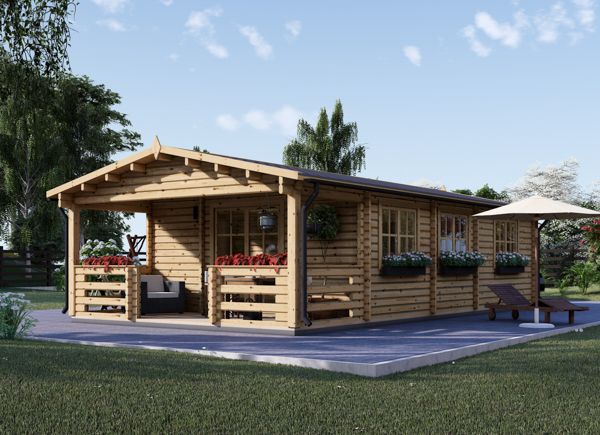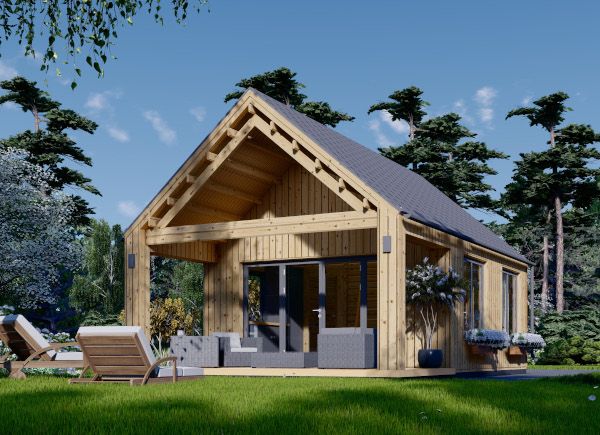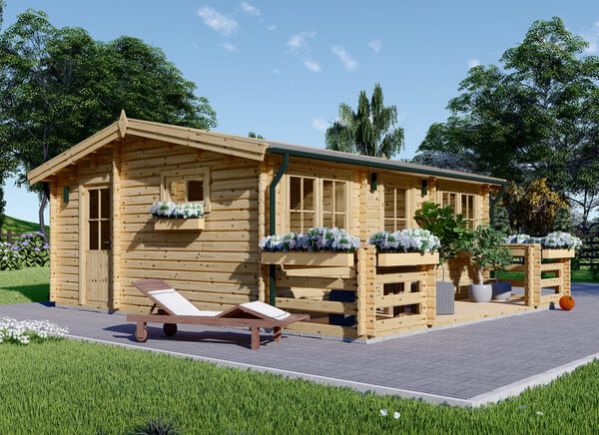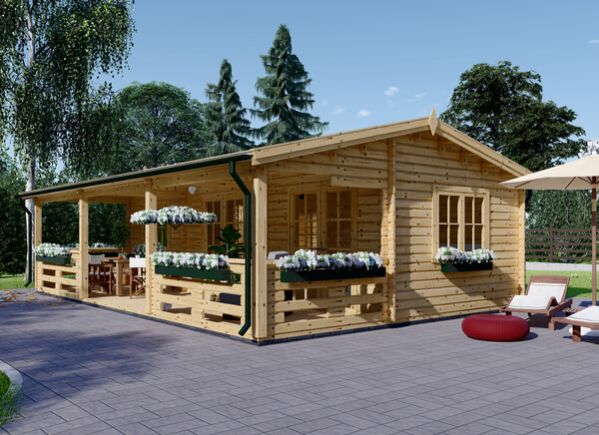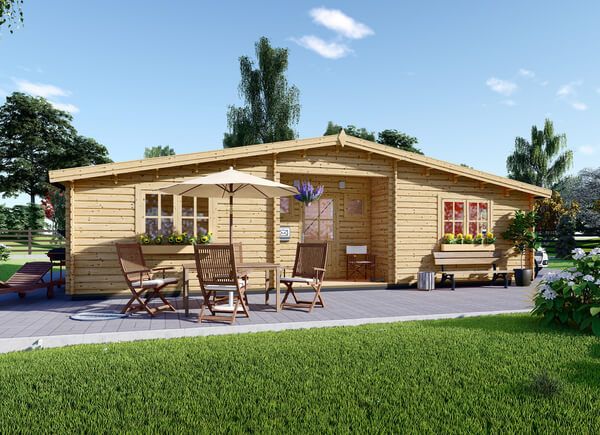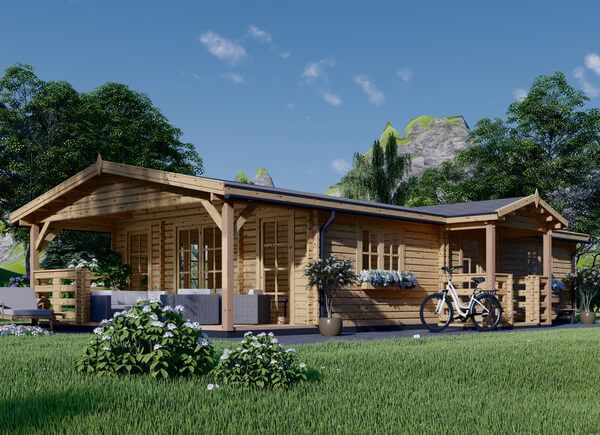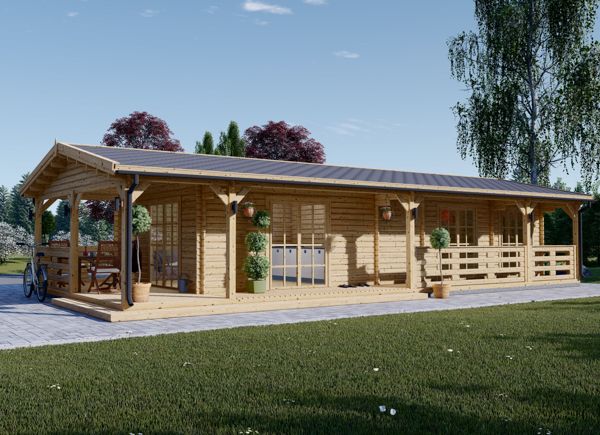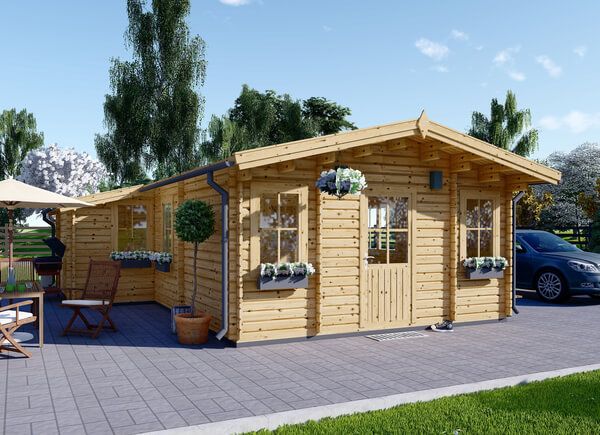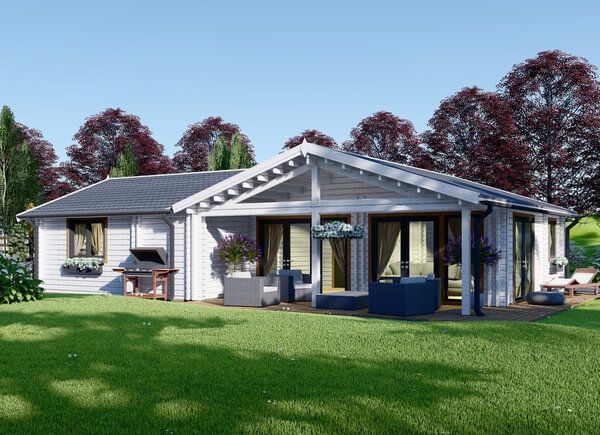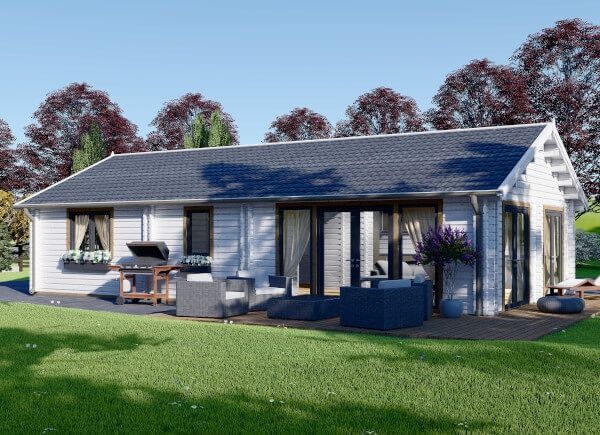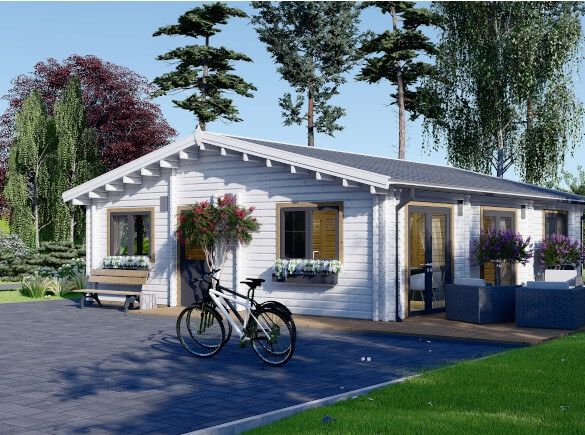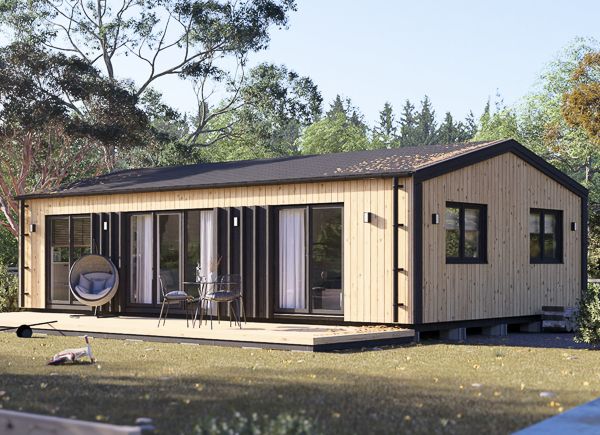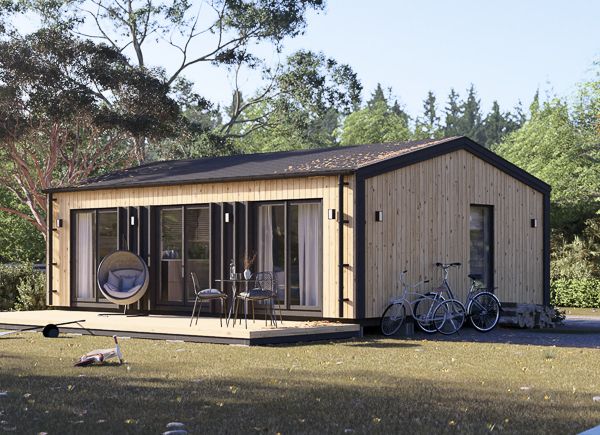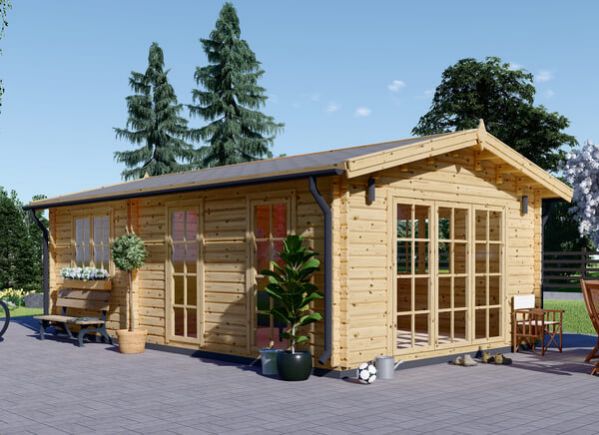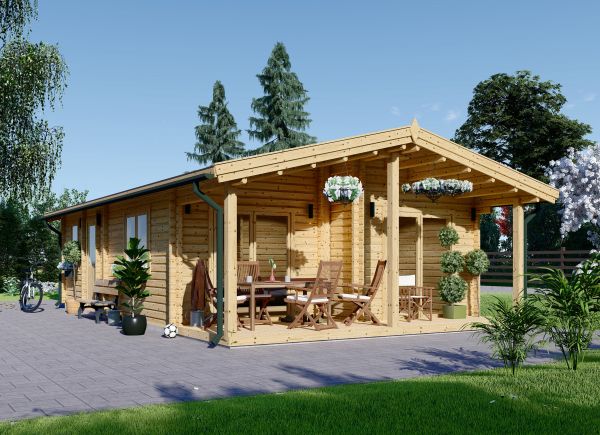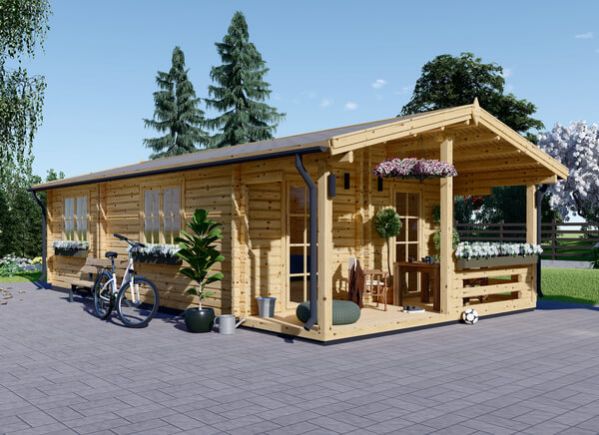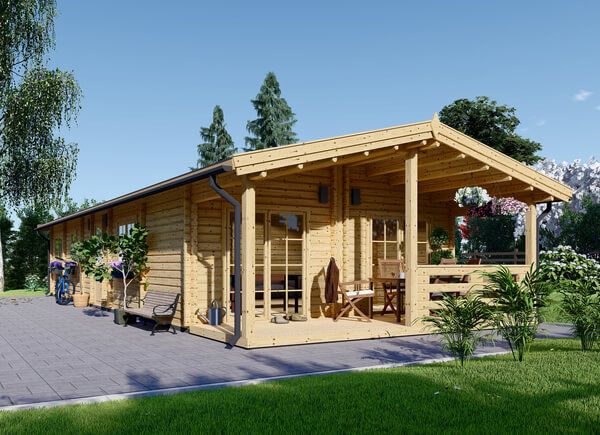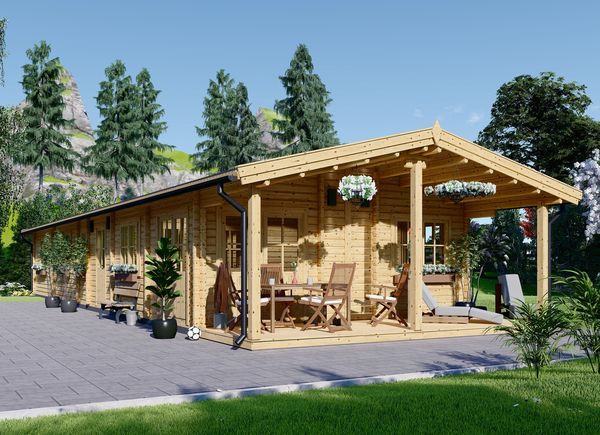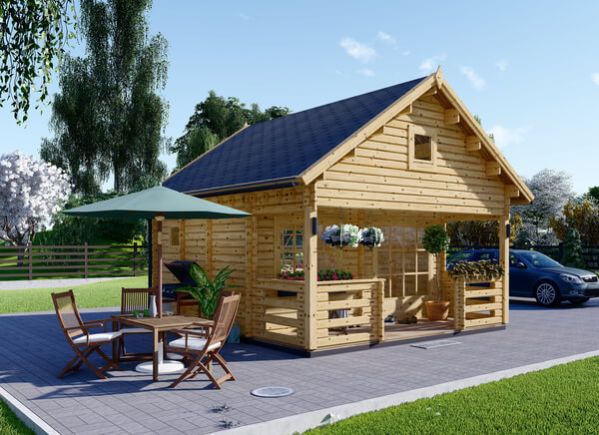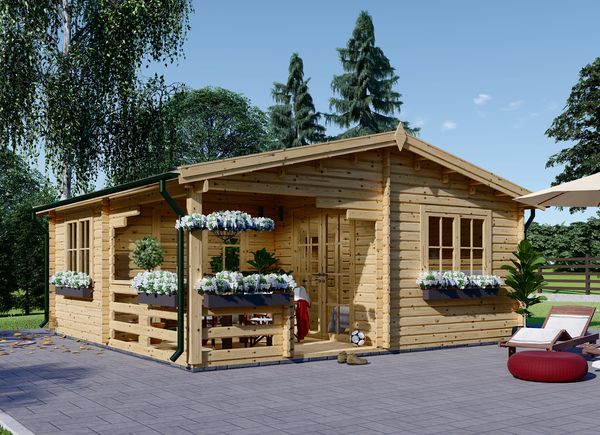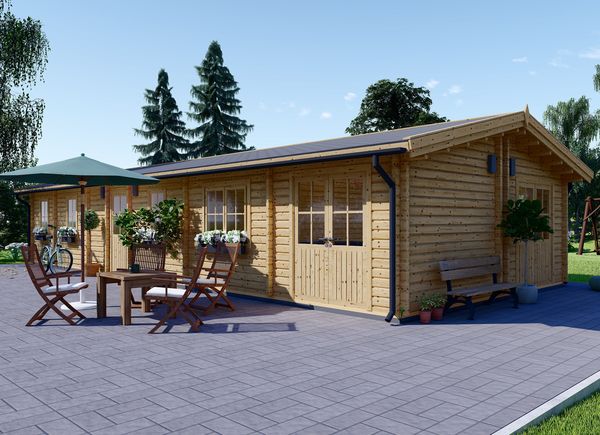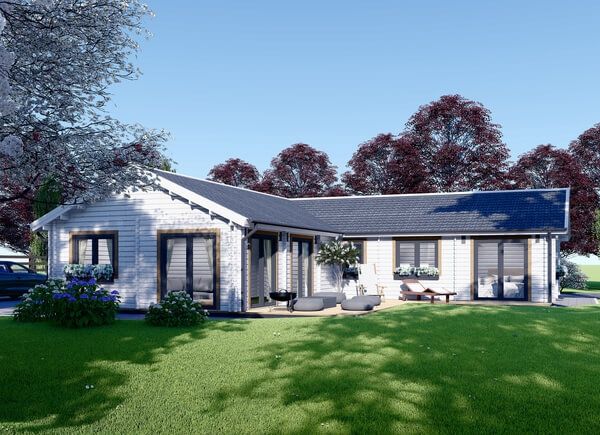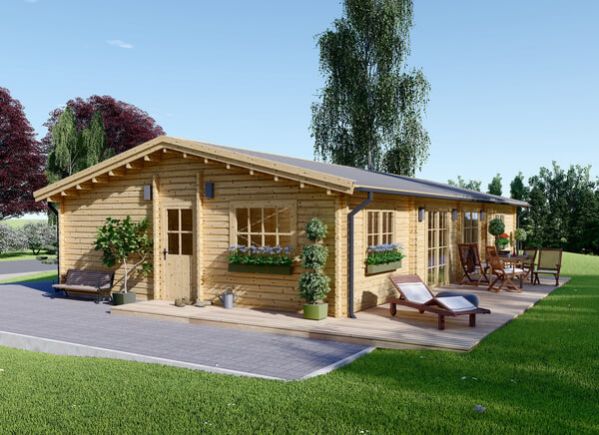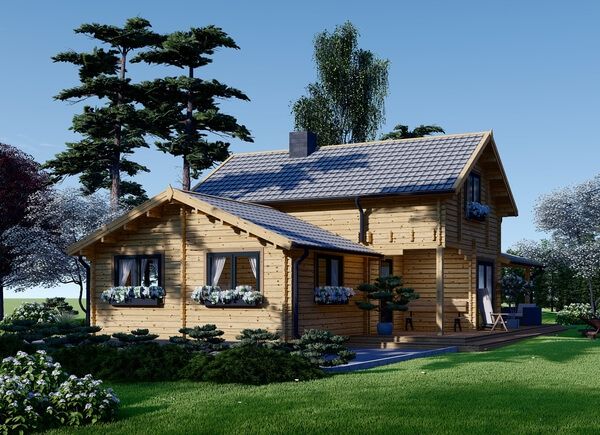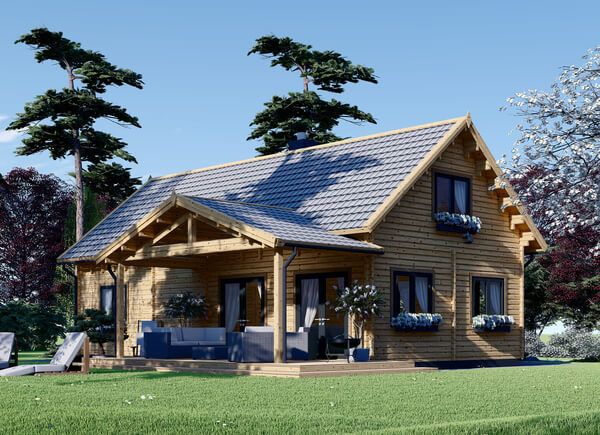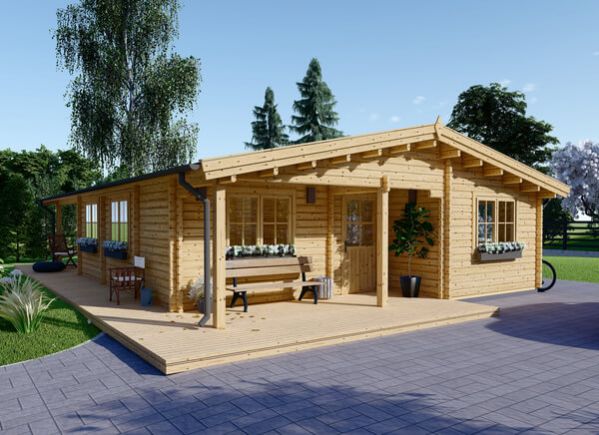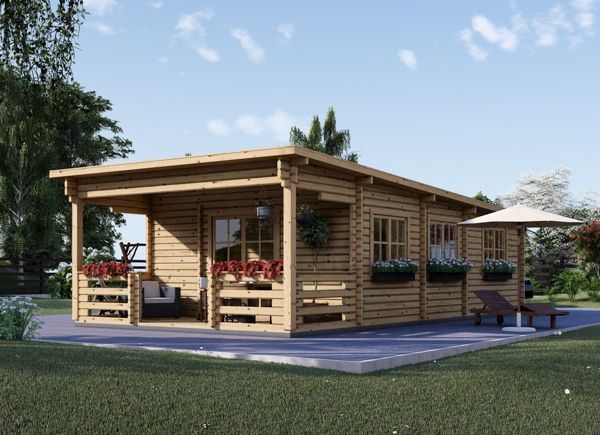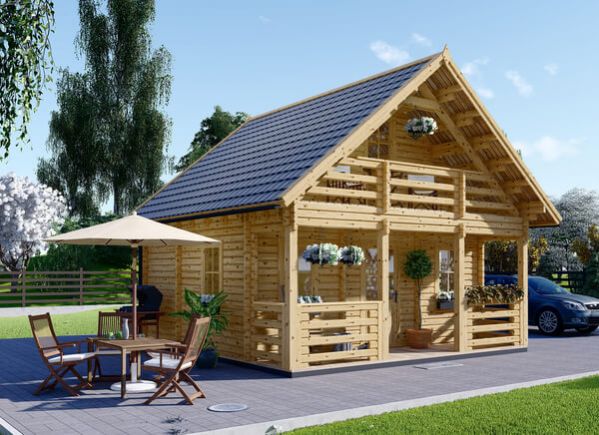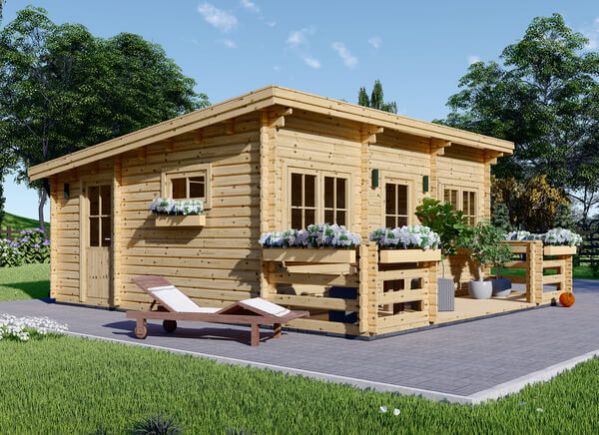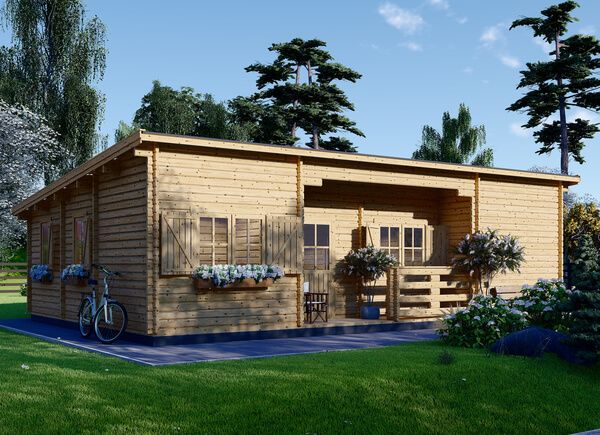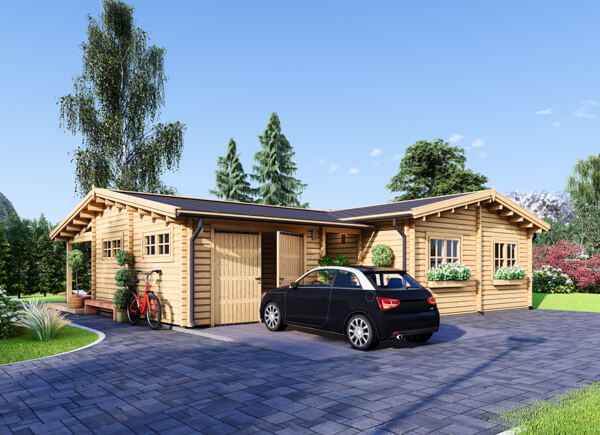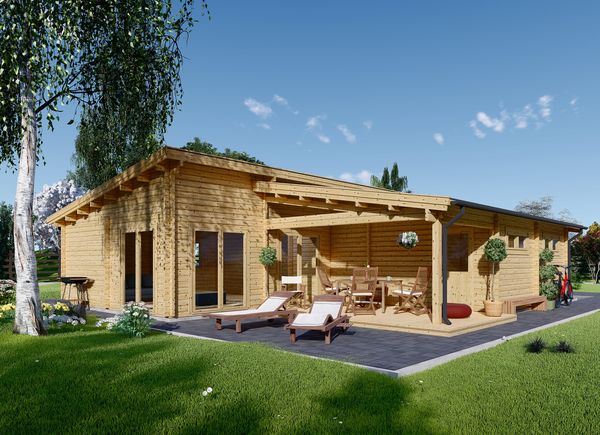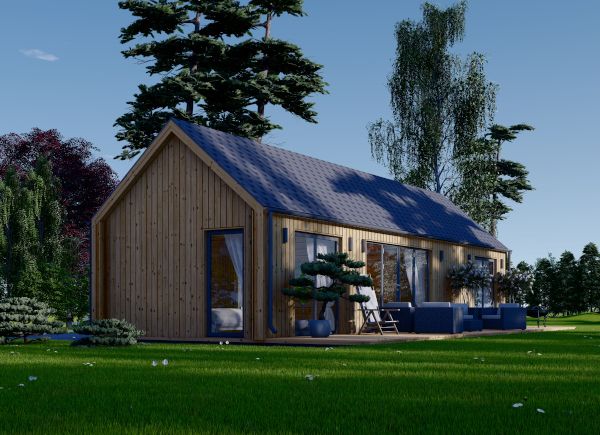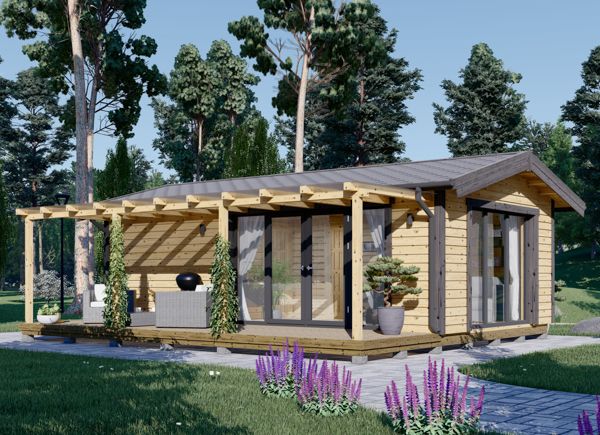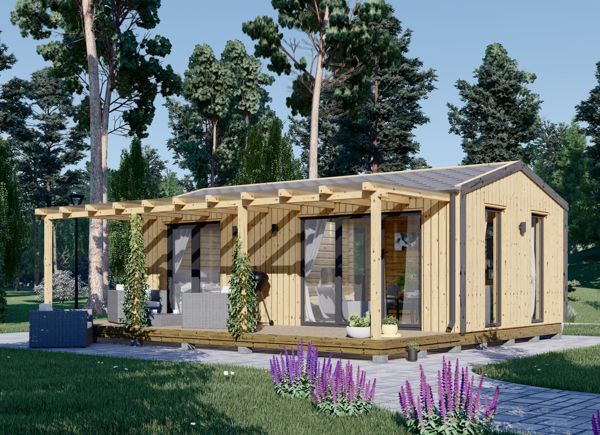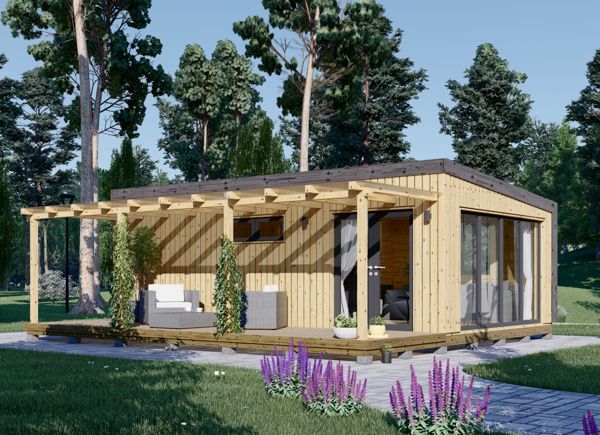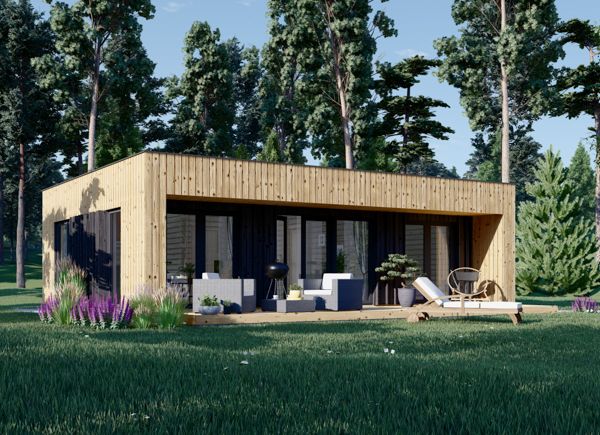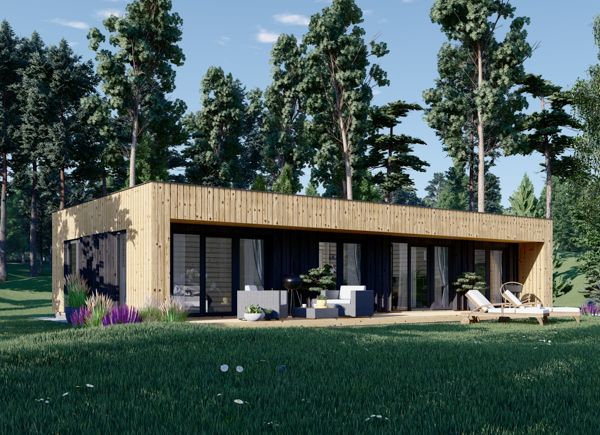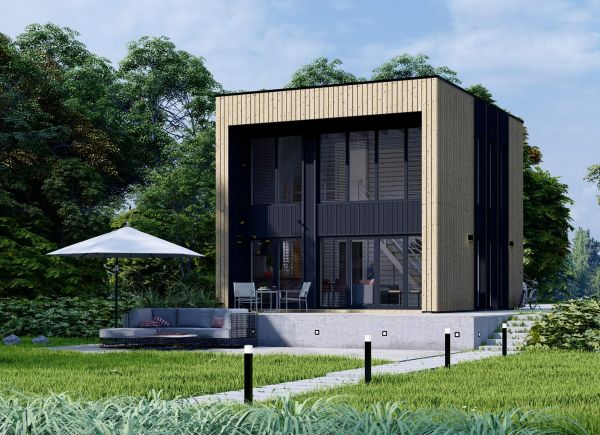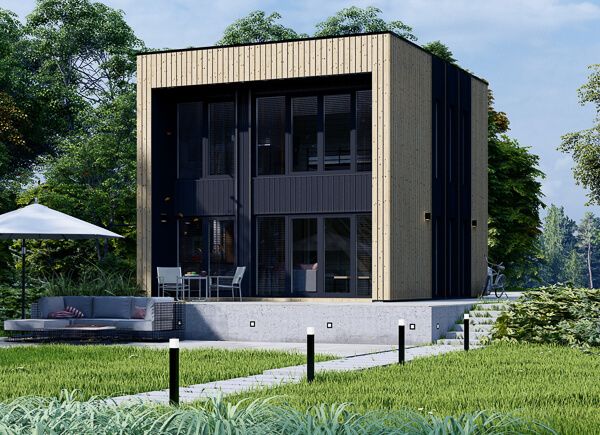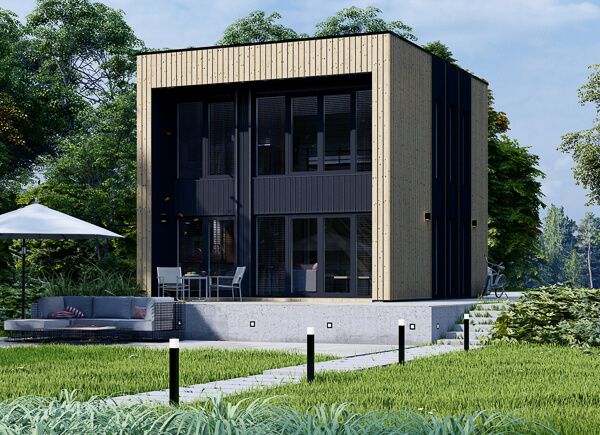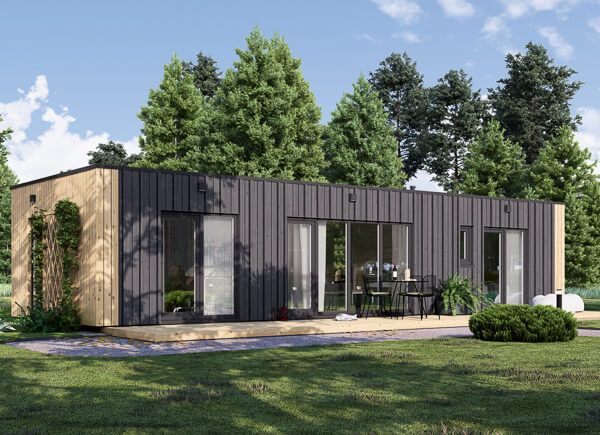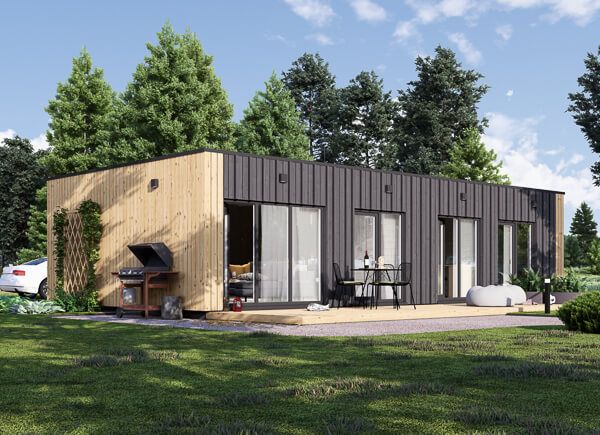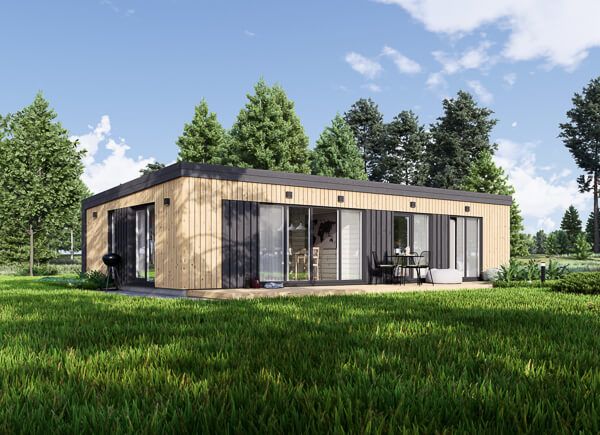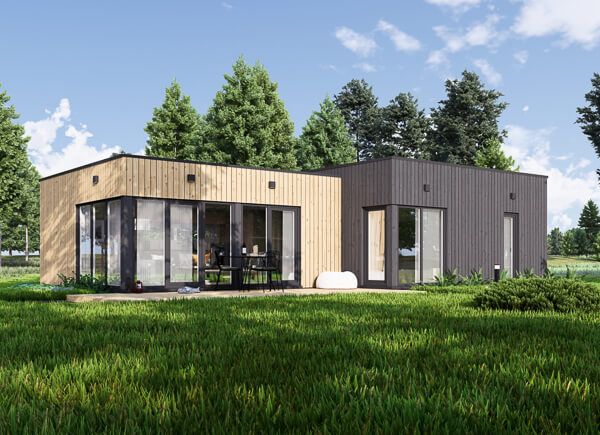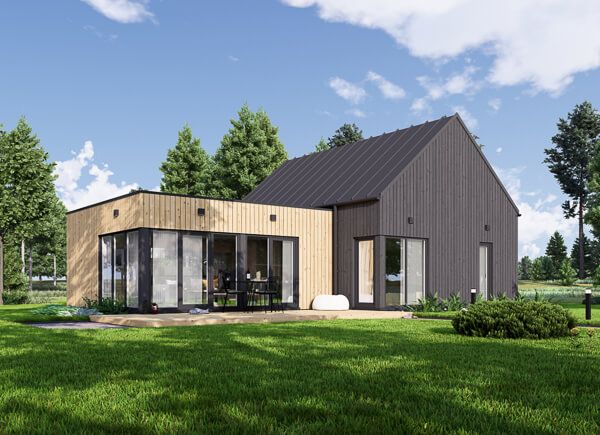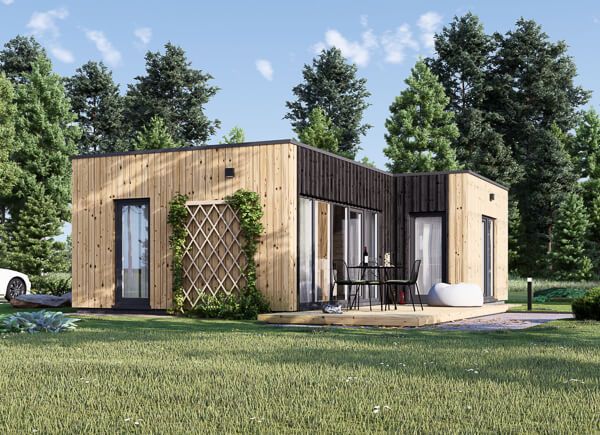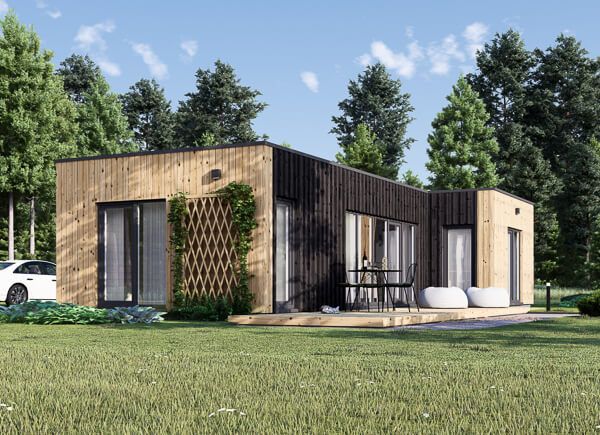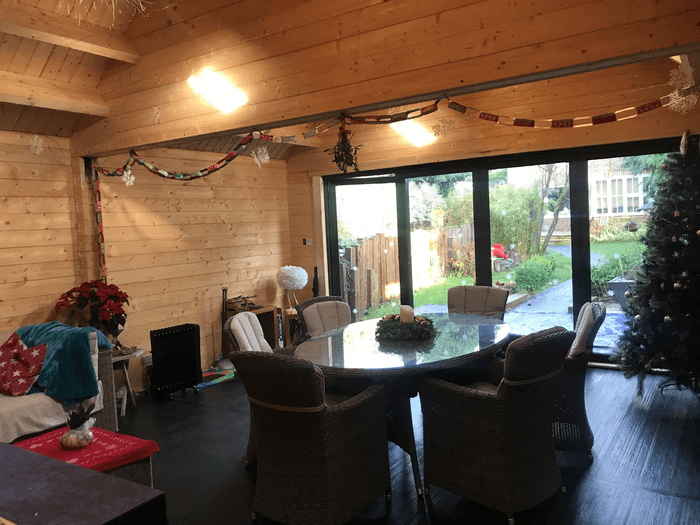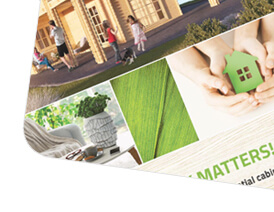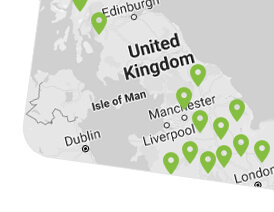Are you sure you want to perform this action?
Residential Log Cabins
Selected
A spacious, modern 3-bedroom log cabin house AGNES S has been designed for you to enjoy the natural light and surrounding landscape. Four large double glass doors on the front side of the building ensure easy access to almost any room. AGNES S is a perfect accommodation for 4 or more people, ensuring that each resident has their own private space. The building’s main point of attention is a centrally located living room, providing enough space for cooking, lounging, dining and communicating with your loved ones. Besides, this model also features anthracite PVC windows and doors that are included in the price.
- 3 bedrooms
- Anthracite PVC windows and doors
- Residential grade insulation level
Special Price: £39,585.00
A classic style wooden house ANGERS S is a beautiful and budget-friendly model, that could bring you and your family many unforgettable moments. Featuring sturdy & reliable construction, efficiently laid out internal space and a charming spacious terrace, ANGERS S is often chosen as a family vacation house. Get ready to experience a slower, more natural pace of life in this magnificent building! Besides, this model has the floor, plus wooden windows and doors included in the price. There is also a possibility to insulate the walls and the roof in the future, as there is a gap between the walls fit for insulation material up to 100 mm.
- 11 m² loft as a bedroom space
- Extraordinary 19 m² terrace
- The walls and the roof can be insulated
Special Price: £15,950.00

Provide us with details about it. We'll be happy to help!
Write Us A MessageWooden house LANGON S is one of our more spacious traditional-style models, featuring a convenient two-storey construction. The most exquisite highlight of this house – two stylish balconies on the second floor – could be used for having slow breakfasts, or relaxed tea or coffee breaks throughout the day. Aesthetics, functionality, and comfort – all these essential qualities have been considered when designing a classical style gem LANDON S. Besides, this model has the floor and wooden windows included in the price.
- 2 spacious bedrooms
- 2 balconies on the opposite sides
- Includes the floor and wooden windows
Special Price: £37,285.00
Garden cabin OLIVIA S is a classical style masterpiece when it comes to its efficiently distributed internal layout and beautiful exterior aesthetics. Encompassing a charming covered terrace, this classical-style building could transform into your stylish lounging room, remote working space/meeting room, workshop or even a cosy vacation house for shorter stays. Finally, this model in particular includes the floor, windows, and doors, as well as a half-glass, half-wood entrance door in its price. The roof can also be insulated later with insulation material up to 100 mm.
- Compact, functional, and cosy
- 8 m² covered terrace
- The roof can be insulated
Special Price: £12,390.00
Wooden house SCOOT S is admired by many due to its classical style and aesthetically pleasing appearance. Simplistic in its purest form, this house is surprisingly full of delightful and functional elements, such as a sleeping loft for creating a dedicated bedroom space or stylish roof overhang, providing a so-much-needed shade outdoors. Please note that this specific model does not have the floor included in the price.
- 9 m² loft as a bedroom space
- Stylish roof overhang
- The floor is not included in the price
Special Price: £11,452.00

Provide us with details about it. We'll be happy to help!
Write Us A MessageLooking for a practical family home or vacation residence? Perfect – here we have both insulated and uninsulated (depending on your choice) BELLA III, which is a 3-bedroom structure you won't be able to forget. The flat roof leaves the facade open to sunshine and to great views through the tall windows that you'll be able to see from every room. Your favourite one may become the living room, as it can easily fit a well-equipped kitchen, a large dining table, and space for lively discussions on the sofa. Wrapping everything up is the sleek vertical cladding, which shows the slow-grown conifer timber in the best possible light. For your utmost convenience, an insulated version of this model is available as well.
- 3 bedrooms, 2 bathrooms
- A 29 m² open kitchen
- Insulated version available
£32,013.00
A spacious, modern 3-bedroom log cabin house AGNES has been designed for you to enjoy the natural light and surrounding landscape. Four large double glass doors on the rear side of the building ensure easy access to a gorgeous 30 m² terrace from almost any room. AGNES is a perfect accommodation for 4 or more people, ensuring that each resident has their own private space. The building’s main point of attention is a centrally located living room, providing enough space for cooking, lounging, dining and communicating with your loved ones. For your utmost convenience, an insulated version of this model is available as well.
- 3 bedrooms
- Lovely 30 m² terrace
- Insulated version available
£28,829.00
- 2 bedrooms, 2 bathrooms
- 28 m² terrace (as an extra option)
- Insulated version available
£29,345.00
Discover classic style granny annexe ARGO M-N and enjoy minimalistic wooden aesthetics. This comfortable and practical model could provide you with a valuable space extension close to your primary residence. It may also serve you as a family vacation spot throughout the year, if you choose to insulate it with all-around 100 mm thick insulation. ARGO M-N is a lovely model for staying in and enjoying quality time with family and friends whenever you wish. Please note that this particular model has spent a while in stock and may have some damaged parts.
- Double-glazed windows and doors
- A perfect residential space extension
- B-ware: the model spent a while in stock
Special Price: £17,995.00
BUILDING REG FRIENDLY
- Residential grade insulation level
- Available with a flat roof
- 10 m² covered terrace
£38,193.00
BUILDING REG FRIENDLY
- Residential-grade insulation level
- 2 bedrooms
- 12 m² loft space
£34,890.00
Has your house been feeling cramped lately? Building a living space extension in your backyard could save you a lot of hassle when you need some extra room for yourself, visiting friends or a comfortable place of residence for your family members to stay nearby. Wooden house LINCOLN M features a spacious living room area, two mid-size bedrooms, a dedicated bathroom area, and an additional compact space for storage. All you might need from a beautiful traditional style wooden house, and more! For your utmost convenience, an insulated version of this model is available as well.
Important: this mobile cabin home meets all the requirements of the 1968 Caravan Act – therefore, no Planning Permission is usually required if you want to build it within the garden of your existing dwelling to be used as an extra space next to the main house. However, we highly recommend checking with the local planning department before installing it.
- 2 bedrooms
- Spacious and practical
- Insulated version available
£30,176.00
- 10 m² loft as a bedroom space
- Stylish roof overhang
- Insulated version available
£10,467.00
- Available with a flat roof
- A lovely 9 m² terrace
- Insulated version available
£9,658.00
- 13 m² loft as a bedroom space
- Extraordinary 19 m² terrace
- Insulated version available
£13,885.00
- 1 bedroom
- 20 m² covered terrace
- Insulated version available
£13,029.00
- Residential-grade insulation level
- 2 bedrooms
- Lots of natural light inside
£46,686.00
- 2 bedrooms + one spare room
- 23.5 m² living room area
- Insulated version available
£19,916.00
- 2 bedrooms
- Spacious & functional layout
- Insulated version available
£15,823.00
- 2 bedrooms
- 11.5 m² covered terrace
- Insulated version available
£18,219.00
- 2 bedrooms
- Gorgeous 29 m² terrace
- Insulated version available
£27,477.00
- Three separate rooms
- 18 m² living and dining space
- Insulated version available
£12,495.00
- A huge 28 m² living room
- 2 spacious bedrooms
- Insulated version available
£38,496.00
A traditional style, two-bedroom wooden house ANICA is a true gem for a small family, a couple or an elder. This house is made of high-quality natural conifer timber, ensuring a healthy living environment and beautiful architectural aesthetics like all our products. For your utmost convenience, an insulated version of this model is available as well.
- 2 bedrooms
- 25 m² living room
- Insulated version available
£26,802.00
A lovely wooden house ALICE features almost regular square shape, ensuring an incredibly convenient layout and easy access to all rooms. ALICE has three bedrooms and a spacious living room that will easily fit a kitchen, dining space and a lounging corner with a couch and TV set. Two large double glass doors grant easy access to the backyard or garden. We’ve also included a double door for the street-side main entrance. For your utmost convenience, an insulated version of this model is available as well.
- 3 bedrooms
- 25 m² living room
- Insulated version available
£27,068.00
An insulated two-bedroom cabin with a cosy living room could become a perfect place of residence for a family with kids. Also, a great option for elderly grandparents, who love having their grandchildren over and comfortably spending time together, to reside next to the main house.
Important: this mobile cabin home meets all the requirements of the 1968 Caravan Act – therefore, no Planning Permission is usually required if you want to build it within the garden of your existing dwelling to be used as an extra space next to the main house. However, we highly recommend checking with the local planning department before installing it.
- Two-bedroom cabin
- Insulated throughout
- Contemporary vertical cladding
Special Price: £33,147.00
One of our newest models – a charming insulated one-bedroom granny annexe – provides lots of space to comfortably reside in all-year-long. Whether you are planning to live there yourself or want your loved ones to stay within easy reach, this cabin will work just great for a variety of purposes and applications.
Important: this mobile cabin home meets all the requirements of the 1968 Caravan Act – therefore, no Planning Permission is usually required if you want to build it within the garden of your existing dwelling to be used as an extra space next to the main house. However, we highly recommend checking with the local planning department before installing it.
- One-bedroom cabin
- Insulated throughout
- Contemporary vertical cladding
Special Price: £28,434.00
Compact, welcoming, and cosy wooden house MAX M seems to be specifically created to become your favourite lounging space in the garden, allowing you to admire the beauty you’ve created in your surroundings. It could even transform into a temporary accommodation for your guests or family members visiting for the weekend. If properly insulated, such a house could serve as an independent living space as well. For your utmost convenience, an insulated version of this model is available as well.
Important: this mobile cabin home meets all the requirements of the 1968 Caravan Act – therefore, no Planning Permission is usually required if you want to build it within the garden of your existing dwelling to be used as an extra space next to the main house. However, we highly recommend checking with the local planning department before installing it.
- 3 separate spaces
- Bright and cosy
- Insulated version available
£11,097.00
Single-storey mobile house MEGAN M, covering 60 m² of internal space, including a charming, covered terrace, is a compact and cosy wooden solution, providing the required qualities to become one’s comfortable living space. If you want to stay warm and comfortable in this wooden beauty all year round, choosing an insulated version is a must! Conifer timber has natural insulation properties – upgrade it with an additional thermal insulation package and never look back! For your utmost convenience, an insulated version of this model is available as well.
Important: this mobile cabin home meets all the requirements of the 1968 Caravan Act – therefore, no Planning Permission is usually required if you want to build it within the garden of your existing dwelling to be used as an extra space next to the main house. However, we highly recommend checking with the local planning department before installing it.
- Stylish 8m² covered terrace
- 24 m² living room area
- Insulated version available
£26,010.00
Discover a classical style wooden house ARGO M and enjoy minimalistic wooden aesthetics in your surroundings. This highly functional, comfortable and practical model could provide you with a valuable living space extension close to your primary residence or, if reliably thermally insulated, could serve you as an all-year-round family vacation spot. For your utmost convenience, an insulated version of this model is available as well.
Important: this mobile cabin home meets all the requirements of the 1968 Caravan Act – therefore, no Planning Permission is usually required if you want to build it within the garden of your existing dwelling to be used as an extra space next to the main house. However, we highly recommend checking with the local planning department before installing it.
- 8 m² terrace for outdoor lounging
- A perfect residential space extension
- Insulated version available
£14,763.00
Discover a classical style wooden house ARGO M and enjoy minimalistic wooden aesthetics in your surroundings. This highly functional, comfortable and practical model could provide you with a valuable living space extension close to your primary residence or, if reliably thermally insulated, could serve you as an all-year-round family vacation spot.
Important: this mobile cabin home meets all the requirements of the 1968 Caravan Act – therefore, no Planning Permission is usually required if you want to build it within the garden of your existing dwelling to be used as an extra space next to the main house. However, we highly recommend checking with the local planning department before installing it.
- Thermally insulated
- 8 m² terrace for outdoor lounging
- A perfect residential space extension
£27,603.00
Wooden house AVON with 11.5 m² covered terrace offers just the optimal amount of space for a mid-sized or larger family. If you want a spacious and comfortable family house, conveniently divided into numerous smaller spaces, definitely consider this model – it might be precisely the one for you! For your utmost convenience, an insulated version of this model is available as well.
Important: this mobile cabin home meets all the requirements of the 1968 Caravan Act – therefore, no Planning Permission is usually required if you want to build it within the garden of your existing dwelling to be used as an extra space next to the main house. However, we highly recommend checking with the local planning department before installing it.
- 11.5 m² covered terrace
- 2 bedrooms
- Insulated version available
£39,572.00
One of our largest wooden house models – granny annexe BOSTON – could be the perfect secondary accommodation for your entire family and friends during cosy weekend stays or fun family celebrations. Due to its functionality and vast interior space, this gorgeous prefabricated building, made of natural conifer timber, have enormous potential of becoming your family’s summerhouse or even a primary living space. Spend valuable time together, surrounded by the best company, nature and fresh air. For your utmost convenience, an insulated version of this model is available as well.
Important: this mobile cabin home meets all the requirements of the 1968 Caravan Act – therefore, no Planning Permission is usually required if you want to build it within the garden of your existing dwelling to be used as an extra space next to the main house. However, we highly recommend checking with the local planning department before installing it.
- Spacious covered terrace
- 30 m² living room
- Insulated version available
£47,645.00
- Convenient two-storey structure
- 8 m² covered terrace
- Double glazed windows and doors
£11,404.00
- Compact, functional, and cosy
- 8 m² covered terrace
- Insulated version available
£8,957.00
Our gorgeous mobile house BRIGHTON is well equipped with 2 or 3 bedrooms (depending on your internal layout arrangement), a living room, a separate kitchen, bathroom space and several additional smaller rooms which could serve you numerous purposes. Due to its vast space and superb internal layout, this house is a perfect base for large family gatherings or get-togethers with friends. For your utmost convenience, an insulated version of this model is available as well.
Important: this mobile cabin home meets all the requirements of the 1968 Caravan Act – therefore, no Planning Permission is usually required if you want to build it within the garden of your existing dwelling to be used as an extra space next to the main house. However, we highly recommend checking with the local planning department before installing it.
- 2-3 spacious bedrooms
- Covenient internal layout
- Insulated version available
£39,773.00
A contemporary style, L-shape log cabin house, featuring 129 m² of the inside area, could be a delightful choice for a larger family for all-year-round living. Enjoy lovely grilling sessions on a gorgeous terrace (optional feature), surrounded by your whole family and friends. For your utmost convenience, an insulated version of this model is available as well.
- 3 comfortable bedrooms
- Large 35 m² terrace (optional feature)
- Insulated version available
£60,802.00
- 2 spacious bedrooms
- 2 balconies on the opposite sides
- Insulated version available
£36,610.00
- Spacious and cosy
- Two bedrooms
- Insulated version available
£36,857.00
Wooden house HOLLAND is an exceptionally functional structure, adored by many customers in the entire country. Its aesthetically pleasing architectural design provides a more contemporary feel than our classical models and is especially valued by modern style admirers. Enjoy the vastness of space, conveniently laid out in two storeys of the building. For your utmost convenience, an insulated version of this model is available as well.
- 3 bedrooms
- Cosy 13 m² terrace
- Insulated version available
£46,925.00
A two-storey wooden house VERA is highly admired by many customers due to its extraordinary aesthetical appearance and convenient internal layout, allowing each family member or guest to enjoy their privacy. Another lovely highlight of this model is a gorgeous 13.5 m² covered terrace, providing you with the ability to enjoy warm evenings outdoors together with your loved ones. For your utmost convenience, an insulated version of this model is available as well.
- 3-5 bedrooms
- Spacious 13.5 m² terrace
- Insulated version available
£46,315.00
Due to its unique layout, charming wooden house LINDA could not be mistaken with any other model. Beautifully designed, this classical-style building provides numerous outdoor lounging spots and a convenient internal layout. Arrange the space based on your individual needs and imagination, making it the most gorgeous and relaxing place, tailored to your specific requirements. For your utmost convenience, an insulated version of this model is available as well.
- 3 bedrooms
- Spacious covered terrace
- Insulated version available
£32,293.00
Wooden house HYMER with a spacious 10 m² covered terrace is an excellent option for those looking for a relaxed family vacation space or a cosy place of residence for experiencing slow-living closer to nature. A beautiful terrace extends the inside area of the house and allows you to enjoy wonderful moments outdoors despite the weather conditions.
- Residential grade insulation level
- Version with an apex roof available
- 10 m² covered terrace
£38,035.00
Our two-storey wooden house LIVINGTON, featuring traditional wooden aesthetics and optimal space distribution, could serve you as a functional secondary residence or a cosy summer house. Its spacious covered terrace on the first floor and charming balcony on the second floor provide lots of space for convenient lounging outdoors. Enjoy the stillness, relaxation and experience the feeling of slow-living closer to nature.
- Residential grade insulation level
- Spacious and comfortable loft
- Compact and cosy
£39,984.00
A compact classical style wooden house ALTURA features a large living room combined with a kitchen space, a small bedroom for creating a separate sleeping area and a functional bathroom space. Due to its one-storey layout, ALTURA is a great choice for families with small children or elderly households. What is more, a beautiful 9 m² terrace is perfect for having delicious family meals and spending valuable time together outdoors.
- Thermally insulated
- Available with an apex roof
- A lovely 9 m² terrace
£15,879.00
If one would imagine a classical style wooden house featuring plenty of space to comfortably accommodate all the family members and provide enough room to host guests, ensuring everyone’s privacy, it could certainly be our lovely wooden house UZES. Experience the beautiful qualities of natural wood in your surroundings and enjoy life to the fullest in your spacious and cosy wooden residence!
- Thermally insulated
- 2 bedrooms + one spare room
- 23.5 m² living room area
£30,446.00
BUILDING REG FRIENDLY
- Residential grade insulation level
- 20 m² terrace and a large balcony
- 2 bedrooms
£79,264.00
Have you been dreaming of transferring your life to a new residential space that would instantly feel like home? Our wooden cabin BERTA has all the qualities to become one! Aesthetically pleasing exterior design, cosy and well-designed interior layout, reliable tongue & groove construction, and integrated garage for your exceptional comfort make this house stand out among others. For your utmost convenience, an insulated version of this model is available as well.
- Version with a flat roof available
- Integrated garage building
- Insulated version available
£41,037.00
Have you been dreaming of transferring your life to a new residential space that would instantly feel like home? Our wooden cabin BERTA has all the qualities to become one! Aesthetically pleasing exterior design, cosy and well-designed interior layout, reliable tongue & groove construction, and integrated garage for your exceptional comfort make this house stand out among others. For your utmost convenience, an insulated version of this model is available as well.
- Available with an apex roof
- Integrated garage building
- Insulated version available
£42,839.00
The charming wooden house DARLA is a two-storey building that offers 5 bedrooms, 3 bathrooms, a practical layout, and a covered entrance – and that's just the beginning. This model also features a large living room and kitchen area, and the bedrooms can be found on both floors, which is ideal for bigger families that want to have some private space. DARLA also features plenty of windows, making all the rooms bright and airy. For your utmost convenience, an insulated version of this model is available as well.
- 5 bedrooms
- 30 m² covered terrace
- Insulated version available
£66,223.00
A bright and spacious insulated log cabin house ADALINE attracts the eyes of many due to its sleek contemporary architectural design. Its beauty lies in the wonderful forms and modern cladding solutions as well as large windows, letting all the beautiful sunshine in and brightening up your space. A delightful 24 m² terrace (optional feature) could provide you with the freedom to enjoy quality time outdoors.
- Residential-grade insulation level
- 2 bedrooms
- PVC windows and doors
£39,015.00
- Horizontal timber cladding
- 1 bedroom & a spacious living room
- Efficient thermal insulation
£20,312.00
- Available with a flat roof
- 1 bedroom & a spacious living room
- Efficient thermal insulation
£18,604.00
- Available with a flat roof
- 1 bedroom & a spacious living room
- Efficient thermal insulation
£19,052.00
- 1 bedroom, 1 bathroom
- 20 m² terrace (as an extra option)
- Insulated version available
£23,852.00
- 3 bedrooms, 1 bathroom
- 31 m² terrace (as an extra option)
- Insulated version available
£31,994.00
The ultimate representation of modern architecture, KAYA 4L is a striking structure that will leave an impression on anyone who lays eyes on it. The layout of this model is very family-friendly, as there's a huge 20 m² living room, 2 bathrooms, and a bedroom upstairs. You'll also find a room that can be converted into a workspace or an additional bedroom. The large windows will help you enjoy sunny days inside, and stepping out on the covered terrace may also turn into a small delight. For your utmost convenience, an insulated version of this model is available as well.
- 1 bedroom, 2 bathrooms
- A cosy terrace with an option to extend it
- Insulated version available
£34,488.00
The ultimate representation of modern architecture, KAYA 4 is a striking structure that will leave an impression on anyone who lays eyes on it. The layout of this model is very family-friendly, as there's a huge 20 m² living room, 3 bathrooms, and 2 bedrooms upstairs. You'll also find a room that can be converted into a workspace or an additional bedroom. The large windows will help you enjoy sunny days inside, and stepping out on the covered terrace may also turn into a small delight. For your utmost convenience, an insulated version of this model is available as well.
- 2 bedrooms, 3 bathrooms
- A cosy terrace with an option to extend it
- Insulated version available
£38,198.00
The ultimate representation of modern architecture, KAYA 4 is a striking structure that will leave an impression on anyone who lays eyes on it. The layout of this model is very family-friendly, as there's a huge 20 m² living room, 3 bathrooms, and 2 bedrooms upstairs. You'll also find a room that can be converted into a workspace or an additional bedroom. The large windows will help you enjoy sunny days inside, and stepping out on the covered terrace may also turn into a small delight.
- 2 bedrooms, 3 bathrooms
- A cosy terrace with an option to extend it
- Residential-grade insulation level
£61,317.00
Looking for a practical family home or vacation residence? Perfect – here we have both insulated and uninsulated (depending on your choice) BELLA I, which is a 2 bedroom structure you won't be able to forget. The flat roof leaves the facade open to sunshine and to great views through the tall windows that you'll be able to see from every room. Wrapping everything up is the sleek vertical cladding, which shows the slow-grown conifer timber in the best possible light.
- 2 bedrooms
- An optional 21 m² terrace
- Thermally insulated
£28,859.00
Looking for a practical family home or vacation residence? Perfect – here we have both insulated and uninsulated (depending on your choice) BELLA II, which is a 2-bedroom structure you won't be able to forget. The flat roof leaves the facade open to sunshine and to great views through the tall windows that you'll be able to see from every room. Your favourite one may become the living room, as it can easily fit a well-equipped kitchen, a large dining table, and space for lively discussions on the sofa. Wrapping everything up is the sleek vertical cladding, which shows the slow-grown conifer timber in the best possible light. For your utmost convenience, an insulated version of this model is available as well.
- 2 bedrooms
- A 29 m² open kitchen
- Insulated version available
£25,806.00
Feel the charm of the structure, representing the perfect family residence or an ultra-comfortable holiday home. A well-designed internal space of the building can be extended by incorporating a gorgeous front terrace, providing many wonderful opportunities to spend your time outdoors. Wide entrances from all rooms to the terrace allow free and convenient movement, enjoying your residential surroundings. For your utmost convenience, an insulated version of this model is available as well.
- 2 bedrooms
- 32 m² living room
- Insulated version available
£28,047.00
Discover your peaceful retreat at our gorgeous wooden house MALLY – a sleek contemporary model featuring a more unique construction and highly functional internal layout. One part of the building is dedicated to lounging, living and leisure, while the other is all about comfortable relaxation. Two bedrooms with two private bathrooms ensure all the residents' comfort, while a large living area provides a perfect place for enjoying time together. The terrace could be a nice upgrade – providing a cosy corner for family brunches and joyful weekends with friends. For your utmost convenience, an insulated version of this model is available as well.
- 2 bedrooms, 2 bathrooms
- Efficient layout
- Insulated version available
£31,920.00
Let us present you with a charming wooden house, MIRABEL – a contemporary architectural design with the utmost functionality in mind. Its unusual form instantly catches the eye, delighting with a combination of different types of roof shapes. Discover the ultimate benefits of this exceptional building and make it your permanent residence or a holiday home! For your utmost convenience, an insulated version of this model is available as well.
- 2 bedrooms, 2 bathrooms
- Open-plan living room
- Insulated version available
£39,463.00
40 m² of family fun – this could be the way you introduce your new favourite place to relish all that each day has to offer. On the outside, you'll see a design that's both practical and keeps the attention of anyone admiring its cohesion. On the inside, it's marvellously convenient, with spaces that allow for experimentation in the kitchen, a cosy living room, a spacious bedroom that can fit a king-size bed, and more. Explore the layout yourself – the daydreams of living in LUCIA I will come on their own! For your utmost convenience, an insulated version of this model is available as well.
- 1 bedroom, 1 bathroom
- Beautiful vertical cladding
- Insulated version available
£19,602.00
50 m² of family fun – this could be the way you introduce your new favourite place to relish all that each day has to offer. On the outside, you'll see a design that's both practical and keeps the attention of anyone admiring its cohesion. On the inside, it's marvellously convenient, with spaces that allow for experimentation in the kitchen, a cosy living room, 2 spacious bedrooms that can fit a king-size beds, and more. Explore the layout yourself – the daydreams of living in LUCIA II will come on their own! For your utmost convenience, an insulated version of this model is available as well.
- 2 bedrooms, 1 bathroom
- Beautiful vertical cladding
- Insulated version available
£23,780.00

Provide us with details about it. We'll be happy to help!
Write Us A Message




 Log Cabins
Log Cabins

